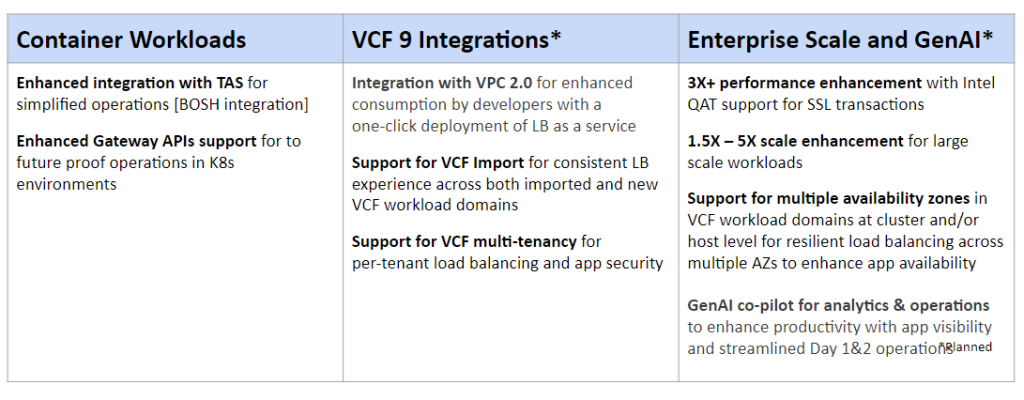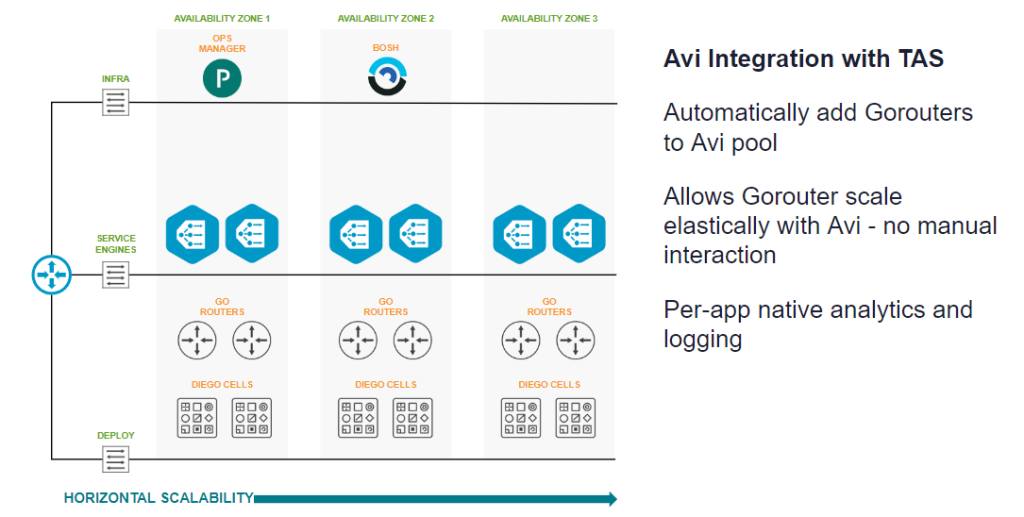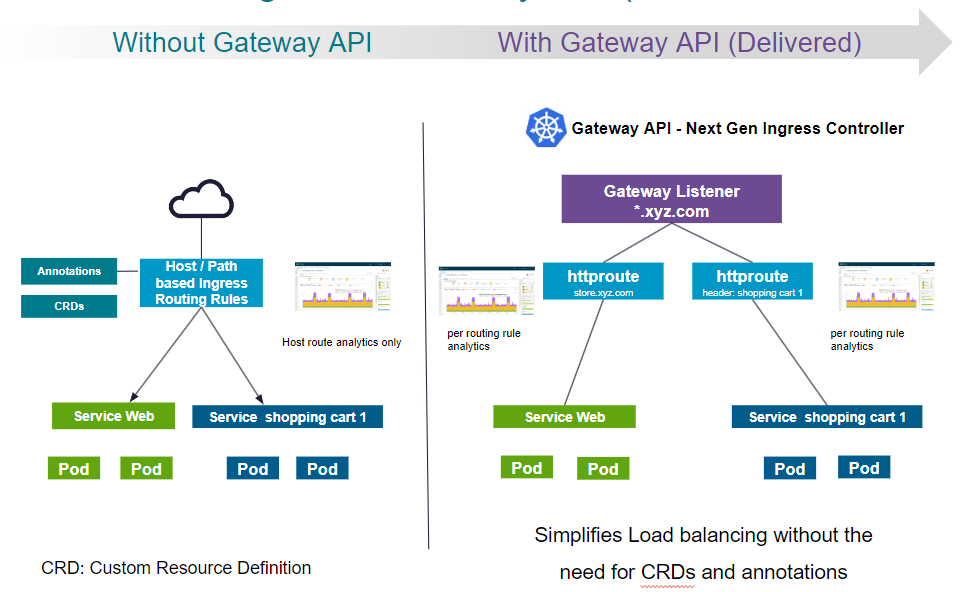Digital enterprises’ need for applications is unrelenting, and IT teams are tasked to deliver the load balancing infrastructure at the speed of applications. After all, no application can be deployed without a load balancer. Unfortunately, traditional hardware appliance-based load balancers are not built with cloud principles (hence not software defined, not distributed, not elastic), resulting in complex deployment and operational workflows that add days and weeks of delay for deploying applications.
VMware Avi Load Balancer, on the other hand, is built ground-up with cloud principles and delivers a cloud operating model (due to plug and play integrations and built-in application analytics) and cloud speed (due to self service). Avi Load Balancer is also ideal as Ingress for a highly dynamic and distributed Kubernetes environment, with added benefits of application visibility and security through web application firewall.
At VMware Explore 2024, Avi is excited to announce current and future innovations in the following categories:
Container Workloads Enhancements
- Integration with Tanzu Platform for Cloud Foundry (formerly Tanzu Application Service) for automated load balancing
- Enhanced support for Gateway API to future proof Kubernetes workloads with next generation container ingress
Integrations with VMware Cloud Foundation (VCF) 9
- VCF Import support for a unified experience with new and existing workload domains
- Native virtual private cloud (VPC) deployment for “one-click” deployment of Avi
- VCF multi-tenancy support to enable self-management on a per tenant basis
- Multi availability zone (AZ) to improve resiliency
Enterprise Scale and GenAI-Based Innovations
- 3X+ secure sockets layer (SSL) performance increase
- Increase scale by 1.5X – 5X to support continued scaling of applications
- Support for multi availability zone (AZ) to improve resiliency
- Enhance IT productivity by leveraging GenAI co-pilot for analytics and operations

Cloud-Architected Load Balancer Best Suited for Automation
Avi is the load balancer of choice for Tanzu Platform for Cloud Foundry – formerly Tanzu Application Service. The native integration automates adding Tanzu Platform for Cloud Foundry grouter to the load balancer pool and speeds up app deployment on Tanzu Platform for Cloud Foundry from weeks to minutes. It reduces the scale limitations and lack of automation with hardware load balancers. Tanzu Platform for Cloud Foundry customers now can leverage the enterprise features of Avi including SSL decryption along with network address translation (NAT) and routing capabilities, certificate management, as well as per-app analytics – insights that have never been attained before with other load balancers.

Enhanced Gateway API Support for Kubernetes Environments
Gateway API is a specification that defines a standard way to configure and manage application traffic routing into Kubernetes clusters, replacing the ingress API with HTTProute. Avi supports both traditional ingress and gateway API, future proofing your Kubernetes based applications. Features include core traffic routing capabilities such as header based matching and traffic weighting. Avi’s Gateway API also supports canary deployments for CI/CD DevOps. Planned functionalities include support for Service Mesh such as Istio, additionally NodePortLocal with Antrea – a Kubernetes Container Network Interface (CNI). Avi’s SDN architecture brings unparalleled per route insights and visibility to applications. With the implementation of Gateway API, the reliance on CustomResourceDefinition (CRDs) and /or annotations will be significantly reduced. Avi brings enterprise grade load balancing and ingress to make your Kubernetes stack production ready with all Kubernetes services (GSLB, WAF, DNS and IPAM) consolidated.

Planned Integrations with VMware Cloud Foundation 9 (VCF 9)
Avi plans support the following integrations with VCF 9.
VCF Import: Avi plans to provide consistent load balancing experience across both imported and new VCF workload domains.
Native VPCs: Enhancements to enable Avi as one-click deployment of load balancing as a service. The support enables faster provisioning of applications, reduces operational complexities and increases DevOps team productivity with self-service and automation.
VCF Multi-tenancy: Avi has natively supported comprehensive multi-tenancy and role-based access control (RBAC). Avi will continue to be compatible with multi-tenancy in VCF 9, enabling infrastructure owners to provision Avi on a per tenant basis. Customers will be able to enforce utilization policies, monitor quotas and plan their shared Service Engine groups. Avi makes it easy to offload self-management of the segmented infrastructure to their respective tenants.
Enterprise Scale and GenAI-Based Innovations
Performance Enhancements: SSL transactions involve compute intensive ciphers and cryptographic algorithms. To address the future multi-fold growth of application traffic, Avi plans to utilize the native SSL offloads technologies built into the server hardware like Intel Quick Assist Technologies (QAT), provided by the latest Intel Xeon platforms (4th Generation Intel® Xeon®, 5th Generation Intel® Xeon® family of processors), to increase the SSL TPS by 3-5x. Scale Improvements: Avi will continue to increase the scale per large Avi Controller cluster.

Multi-AZ Support: Avi’s inherent capabilities of auto-scaling and auto-healing along with GSLB across sites can provide resiliency and high availability to critical applications. For more robustness and granular failure handling, customers are implementing AZs with their custom defined Fault Domains to ensure sufficient business continuity at cluster/host in an individual rack level, servers/host across multiple racks, different halls within a Data Center, and/or across the sites. Avi is providing the customers the capability to define multi-AZ for load balancing infrastructure to adapt to their granular highly resilience architectures.
GenAI Co-pilot for Analytics and Operations: AI has been applied throughout Avi over the years, including learning mode in WAF and anomaly detection based on ML. With GenAI’s great potential in productivity increase and simplified operations, Avi plans to leverage co-pilot for analytics and operations to streamline Day 1 and Day 2 load balancing operations for VCF workloads, including chatbot responses to product, documentation, configuration guides and best practices. See a concept preview screenshot below.
We look forward to sharing more details on the next set of Avi innovations at VMware Explore in Las Vegas (August 26 – 29, 2024). Add the following sessions to your schedule.
- [ANSP2267LV] Innovations in Ransomware Prevention and Cloud-Speed Application Delivery with VMware vDefend and VMware Avi Load Balancer
- [ANSB1834LV] Securing Ingress and Gateway API with Avi Load Balancer for Any Kubernetes
- [INVB1702LV] GenAI-Powered Insights in Avi LB: A Journey into Next-Gen Observability
Learn more from the two blogs on Avi innovations to accelerate application deployment and Plug-and-play load balancing for VCF. Hear what IDC is saying about the Business Value of Avi Load Balancer and how Avi enhances the cloud infrastructure – VCF.
Disclaimer: planned features and functionality are subject to change.








